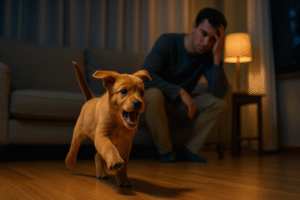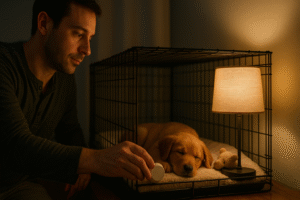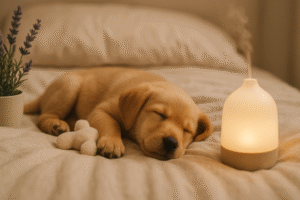Understanding Puppy Hyperactivity and Nighttime Restlessness
Puppies are naturally energetic. They explore, play, and test boundaries from the moment they wake up. But when that energy continues late into the night, many owners find themselves wondering why their puppy refuses to sleep.

What Does It Mean When a Puppy Is Hyperactive?
A hyperactive puppy displays excessive movement or excitement beyond normal play. These bursts of energy—often called zoomies—are normal when brief, but persistent restlessness can indicate overstimulation, lack of structure, or anxiety.
Common Causes of Puppy Hyper Behavior at Night
-
Pent-up energy: Insufficient exercise during the day.
-
Overstimulation: Rough play or new visitors close to bedtime.
-
Inconsistent routine: Irregular feeding and walking schedules.
-
Separation anxiety: Puppies left alone may become anxious or vocal.
Signs of an Overstimulated or Overtired Puppy
Look for constant pacing, whining, spinning in circles, or difficulty settling even after exercise. These are typical hyperactive dog symptoms that mirror canine ADHD in mild form.
Related reading: Puppy Growth Stages Month by Month | Puppy Care Guide for New Owners
Why Is My Puppy So Hyper at Night?
Evening hyperactivity is usually a result of mismatched schedules—your puppy’s internal clock is not yet aligned with your household routine.
Evening Energy Spikes and “Zoomies” Explained
Puppies often experience energy rebounds around dusk. This is a natural instinct inherited from wild canines that were most active during cooler evening hours.
Do Puppies Have ADHD or Canine Hyperkinesis?
While true ADHD in dogs (clinically called canine hyperkinesis) is rare, certain breeds—like Labradors or Border Collies—show high baseline activity. According to PetMD, these dogs need structured exercise and mental enrichment rather than medication.
The Role of Diet, Sleep, and Environment
Feeding high-sugar treats or meals late in the evening can contribute to restlessness. Likewise, noisy environments or excessive light make it harder for a puppy to calm down.
Also see: How Much Sleep Do Puppies Need Each Day? | Puppy Feeding Schedule: 8 Weeks and Beyond
How to Calm a Hyper Puppy at Night (Step-by-Step Routine)

Consistency is the foundation of calm behavior. Here’s a structured routine every owner can follow.
Step 1 – Exercise Early in the Evening
Provide 30–60 minutes of age-appropriate activity—walks, fetch, or gentle play—at least two hours before bedtime. Avoid intense play close to lights-out.
Step 2 – Establish a Relaxing Bedtime Routine
Dim the lights, lower household noise, and use a calm voice. Repetition cues the puppy’s brain that it’s time to rest.
Step 3 – Use Crate Training as a Safe Space
Crates create security and routine. Avoid using them as punishment; instead, make them cozy with soft bedding and a familiar toy.
Step 4 – Avoid Rough Play Before Sleep
High-intensity games elevate adrenaline. Replace them with calm bonding activities like light brushing or soft petting.
Step 5 – Offer Comfort Items
A blanket carrying the owner’s scent or a plush toy can reduce anxiety during separation periods.
Step 6 – Use Gentle Commands or Calming Cues
Teach commands like “settle” or “bedtime” to reinforce the behavior pattern.
Related posts:
Natural Ways to Calm a Hyperactive Puppy

Herbal and Natural Calming Aids
Mild herbal teas (like chamomile) and lavender scents may create a soothing environment. Always confirm safety with your veterinarian before use.
Calming Sounds and Music
Soft instrumental music or canine-specific playlists can reduce stress responses, according to ASPCA behavior research.
Consistent Routine
Predictable feeding and exercise schedules train the puppy’s body clock, reducing hyperactive tendencies.
Massage and Touch Therapy
Gentle strokes along the shoulders and back stimulate endorphins that promote relaxation.
Mental Stimulation Toys
Puzzle toys or slow feeders provide focus and relieve boredom, reducing nighttime restlessness.
Best Toys for Teething Puppies in 2025
Training Techniques for High-Energy Puppies
Positive Reinforcement
Reward calm, quiet moments with praise or treats. Avoid shouting or punishment, which increases anxiety.
Clicker Training
Clicker training helps mark calm behavior. Over time, your puppy associates the click with calmness and reward.
Teaching the “Settle” Command
-
Have your puppy sit or lie down.
-
Say “settle” in a calm tone.
-
Reward stillness.
-
Gradually increase duration before reward.
Keep Sessions Short
Young puppies have limited attention spans; 5–10-minute sessions prevent overstimulation.
More training guides:
When to Worry — Is It Just Puppy Energy or Something More?
Symptoms of Canine ADHD or Hyperkinesis
-
Persistent movement even after long play sessions
-
Difficulty focusing or responding to commands
-
Excessive barking or spinning behavior
-
High heart rate and panting unrelated to heat or exercise
If these persist, consult your veterinarian. According to VCA Animal Hospitals, hyperkinesis requires medical assessment to rule out metabolic disorders.
Medical or Neurological Causes
Allergies, thyroid issues, or diet sensitivities can also cause restlessness. Keep a record of your puppy’s sleep and activity to discuss with your vet.
When to Consult a Professional
If exercise, training, and environment control fail, a certified dog trainer or veterinary behaviorist can evaluate for reactivity or anxiety disorders.
Best Products to Help Calm a Hyper Puppy at Night
Calming Beds and Blankets
Supportive, donut-style beds mimic maternal comfort and reduce fidgeting.
Interactive Toys
Slow feeders or treat-dispensing toys keep minds engaged before bedtime.
Pheromone Diffusers
Vet-approved synthetic pheromones imitate a mother’s scent, promoting calm behavior.
White Noise Machines
Background noise masks external sounds that could trigger barking.
Nutritional Supplements
Omega-3 fatty acids and L-theanine support neurological calm, though they should only be introduced under veterinary advice.
See also: Best Pet Products in 2025
Expert Tips from Trainers and Veterinarians
-
Consistency is key: Fixed sleep and feeding schedules create predictability.
-
Avoid reinforcing excitement: Ignore hyper outbursts instead of engaging.
-
Track daily activity: Balance mental and physical exercise.
-
Understand breed traits: Working breeds require more stimulation than lap dogs.
-
Professional help pays off: A certified trainer can identify overstimulation triggers.
Training hub: Dog Training for Beginners: The Complete Guide
FAQs About Calming a Hyper Puppy at Night
1. Will My Puppy Ever Calm Down?
Yes. Most dogs naturally settle between 12–18 months as their brain matures and routines stabilize.
2. How Long Does Puppy Hyperactivity Last?
High activity peaks around 4–8 months. Consistent training shortens this phase.
3. What Can I Give My Puppy to Calm Them Naturally?
Use natural aids like calming music, structured routines, or vet-approved herbal treats—never human medication.
4. Should I Ignore My Puppy When They’re Hyper at Night?
Briefly ignoring over-excitement teaches that calm behavior earns attention. Avoid yelling or sudden corrections.
5. Can Dogs Have ADHD?
True ADHD (hyperkinesis) is rare but documented. Most “hyper” behaviors are training or environment related.
6. Why Is My Puppy Suddenly Hyper at Night?
Changes in diet, sleep, or routine often trigger temporary spikes in energy.
Creating Calm Nights for You and Your Puppy
Calming a hyper puppy at night requires patience, structure, and understanding. Provide early exercise, maintain consistent routines, and use positive reinforcement to encourage relaxation. Avoid overstimulation before bedtime and ensure a comfortable environment.
Every puppy’s energy levels differ, but with consistent care and gentle training, even the most energetic dog can learn to unwind.
Next step: Explore more guides on Puppy Care and Dog Training for Beginners to help your puppy grow into a calm, confident companion.

